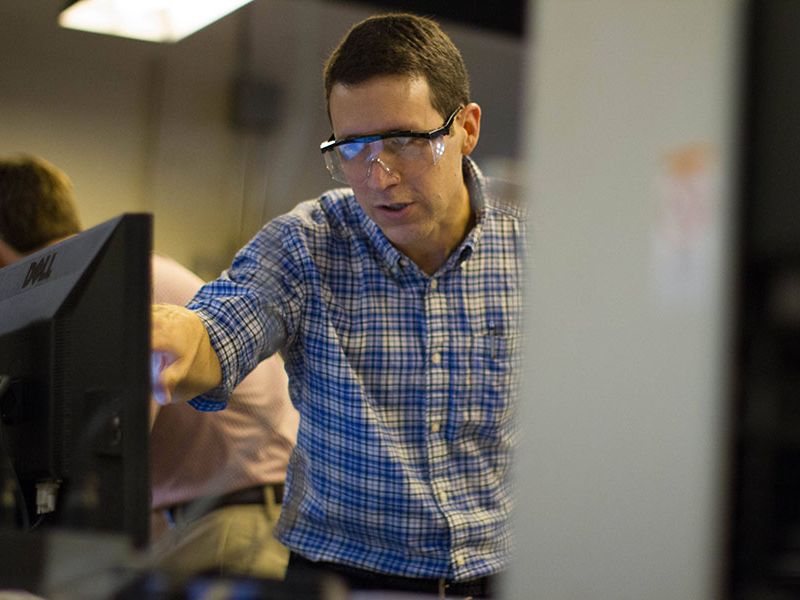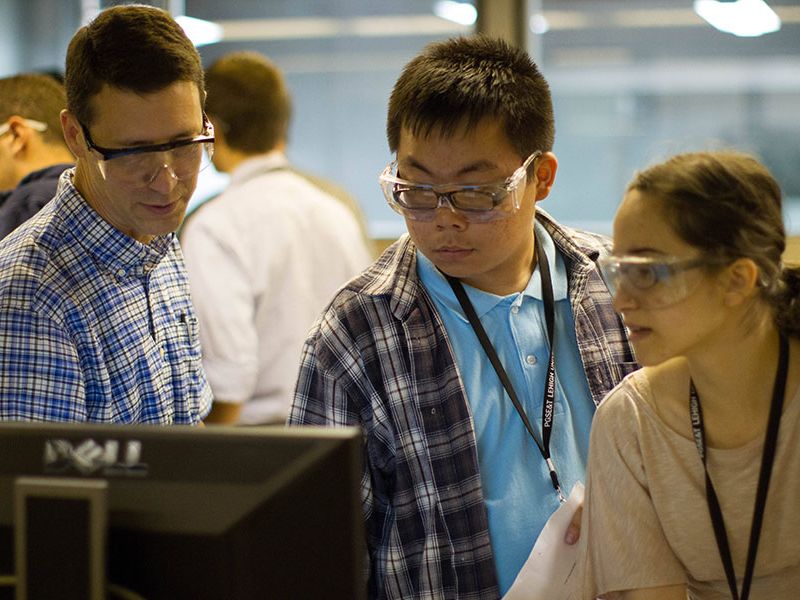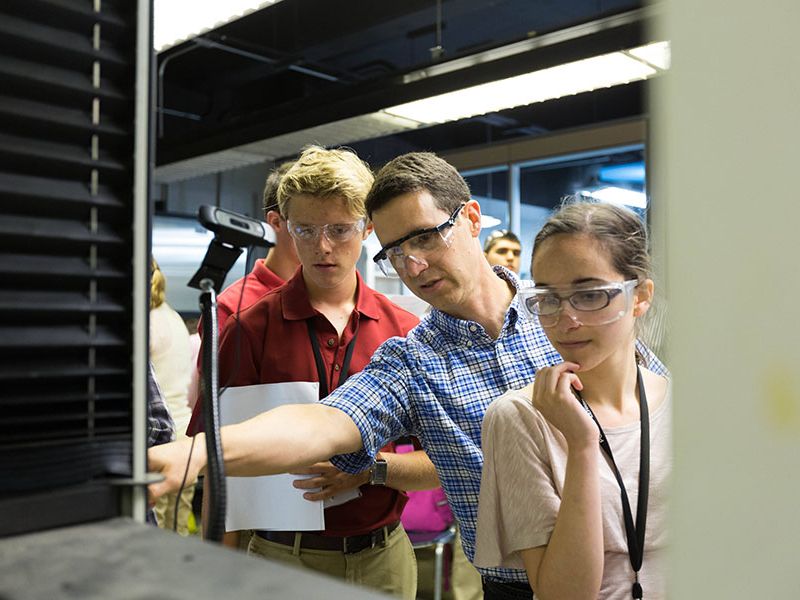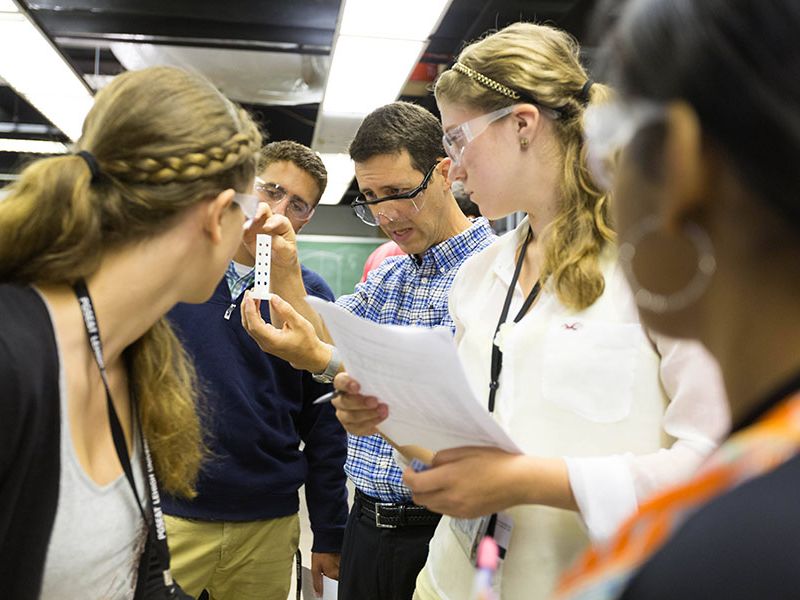Rick Vinci, a man described as a brilliant scholar, adored professor, and treasured friend, died March 13 at the age of 52 following a struggle with ALS (Lou Gehrig’s disease). The professor of materials science and engineering bravely battled the disease for more than two-and-a-half years and had been undergoing experimental treatments in hope of slowing down its progression.
He leaves behind a wife, Michelle Geoffrion-Vinci, a professor of Spanish at Lafayette College, and two daughters.
"Rick was as beloved an educator and colleague as has ever walked Lehigh's campus," said Stephen P. DeWeerth, professor and dean of the P.C. Rossin College of Engineering and Applied Science. "As his peers and students attest, Rick wholly embodied the role of scholar-mentor. He was particularly committed to his students, selflessly giving personal attention to everyone who needed it. His presence, his friendship and his contributions — from research leadership to curricular innovation — will be deeply missed. As a community, our hearts go out to his family at this difficult time.”
DeWeerth also noted that, to honor Vinci’s legacy, the Rossin College has renamed its annual teaching award as the Richard P. Vinci Award for Educational Excellence.
Vinci’s health struggle was chronicled in an April 2018 Boston Globe article following his decision to take part in a late-stage clinical trial at Massachusetts General Hospital. It is believed to be the first of its kind in the U.S. to treat the rare disease that attacks the nervous system, and ultimately prevents the patient from being able to speak, eat and breathe. At that time, Vinci was upbeat, wearing a t-shirt that said “positive state.”
“I have close friends who asked me what my bucket list is,” he is quoted as saying. “It’s not that I want to fly to Greece or bungee jump in the Amazon. I’d like to see my kids graduate from high school. I want to keep working with my students, whom I love.”
Several colleagues shared their impressions of Vinci, who demonstrated a rare gift for relating to people. One of them was New Jersey Zinc Professor Helen Chan, a research partner with Vinci in the department of materials science and engineering, who spoke of him as “a special person who was modest, unassuming but charismatic and likeable, as well as a talented teacher, researcher and administrator.” Chan said she and her colleagues “envied the special relationships that he forged with his students and admired how generous he was with his time.” He was, she said, “academically brilliant, but a real people person who treated everyone around him with warmth and respect.”
She said that generations of students will remember Vinci and his entire class dressing up for Halloween each year, and him picking up the trumpet to play along with the Marching 97 when the band came through the classrooms during Lehigh-Lafayette week. In committees, Chan said he had “a gift for finding consensus, no matter how contentious the issue,” and he had an easy way of developing friendships. “I have not come across a single person who has had a less than positive interaction with him—not anyone. Through his selfless actions and high ideals, he brought out the best in us. We have lost a wonderful human being, far too early.”
Vinci came to Lehigh in 1998 from Stanford University, where he led classes in Introductory Science of Materials and Statistical Thermodynamics as acting assistant professor in the department of materials science and engineering. He was promoted to Lehigh associate professor in 2004, after serving as director of the Mechanical Behavior Laboratory. He received his undergraduate degree in materials science and engineering from the Massachusetts Institute of Technology, and his Master of Science and his Ph.D.—both in materials science and engineering—from Stanford.
Throughout his time at Lehigh, Vinci’s research focused on the processing and properties of thin films and other small volumes of material, with an emphasis on characterizing and modifying mechanical behavior. He had published more than 90 technical papers, co-authored an engineering textbook titled, “Deformation and Fracture Mechanics of Engineering Materials, 5e (Wiley, 2012), and was the co-author of two U.S. patents.
Vinci served for 18 years as the director of Lehigh's Mechanical Behavior Laboratory, and for four years as director of the Center for Advanced Materials and Nanotechnology (CAMN). He organized numerous professional symposia, including the 2008 Gordon Research Conference on Thin Film and Small-Scale Mechanical Behavior, and served as guest editor for a special issue of the MRS Bulletin on mechanical behavior in small dimensions. He was a member of the Materials Research Society, American Ceramic Society, ASM International, TMS and the American Society for Engineering Education.
From 2001-2003, Vinci held a P.C. Rossin Assistant Professorship at Lehigh University, and was the Class of 1961 Associate Professor of Materials Science and Engineering from 2004-2006. Among his numerous awards and honors, he received the ASM International Bradley Stoughton Award for Young Teachers, the Outstanding Young Member Award from the Lehigh Valley Chapter of ASM, the ASM Lehigh Valley Chapter Bradley Stoughton Award, the Lehigh University Junior Award for Distinguished Teaching, the P.C. Rossin College of Engineering Teaching Excellence Award, the Lehigh University Donald B. and Dorothy L. Stabler Award for Excellence in Teaching, as well as his department's Gilbert E. Doan Award, which is given by the graduating senior class.
Read the full story in the Lehigh University News Center
Story by Linda Harbrecht









